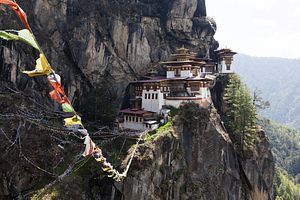Next week Prime Minister Narendra Modi will head to Bhutan, Land of the Thunder Dragon, on his first overseas visit, slated for June 14-15. There had been a great deal of speculation that his first visit abroad would be to East Asia, particularly to Japan, a country with which he developed a strong relationship as Gujarat chief minister. But the selection of Bhutan builds perfectly on Prime Minister Modi’s inaugural outreach to the South Asian region, and demonstrates an astute sense of the region’s critical importance to India’s economic dynamism and strategic strength.
Bhutan and India have a unique relationship. Up until just a couple years ago, India was one of a handful of official bilateral relationships the Bhutanese maintained, and certainly its closest partner. Under the Treaty of Friendship between India and Bhutan of 1949, India “guided” Bhutan’s external affairs. Notably, when that treaty was revised in 2007, the clause providing Indian “guidance” on external affairs was not retained—but India remains Bhutan’s closest partner by far. In 2012, Bhutan threw its hat in the ring for a temporary U.N. Security Council seat, and during the process of its outreach around the world, it increased its number of formal diplomatic relations, now up to fifty-two countries and the European Union. (None of the P5 are among them).
Economically, India is the most important country for Bhutan. As I wrote earlier this week in a piece for YaleGlobal, India is overwhelmingly Bhutan’s major trading partner, especially for electricity generated from hydropower resources. India has assisted with three completed hydropower projects, 10 more are under agreement, and three of those are currently under construction. India and Bhutan have a trade and commerce agreement dating back to 1972, renewed for another 10 years in 2006, and India is also Bhutan’s leading development partner. Of course, India is also closely watching China’s border talks with Bhutan and China’s recent efforts to establish stronger ties with Thimphu.
We can expect that economics will feature prominently in the summit between Prime Ministers Modi and Tobgay, especially discussions of regional economic linkages that deepen the shared futures of India and Bhutan. Bhutan has faced some economic challenges in recent years, including an Indian rupee reserve crunch, which have required some belt-tightening. Last summer, India cut back on the levels of fuel subsidies it provided to Bhutan, which caused great consternation, and the subsidies were quickly restored.
Democracy may be another topic discussed between India and Bhutan. Bhutan’s political transformation from an absolute monarchy to a democratic constitutional monarchy in 2008 has been a rare example of peaceful transition of power to the people. Bhutan’s fourth king decided to step down from the throne, asked his son to succeed him in 2006, and paved the way for national parliamentary elections introduced in 2008. Even more remarkably, in the second national elections which took place in 2013, the opposition party won. So Bhutan has showcased peaceful transitions twice. The Election Commission of India has played a strong role supporting Bhutan’s Election Commission, through training, and through the use of Indian electronic voting machines.
It’s less clear whether Bhutan’s famous Gross National Happiness (GNH) metric will be among the topics of discussion. GNH, a measure of well-being created by the former Bhutanese king, was promoted extensively internationally by the previous government of Bhutan. Two years ago the Bhutanese convened a packed-to-the-rafters “High Level Meeting on Happiness and Well-Being” at the United Nations. (I attended this meeting, and can attest not only to the overflow crowd it attracted, but as well to the diversity of backgrounds represented in the audience, from development economists to religious figures). GNH was a reason Bhutan worked carefully to preserve its environment, and prevent the kind of unchecked development that had resulted in deleterious effects and environmental degradation elsewhere in the world. But Bhutan’s new Prime Minister Tobgay is less focused on GNH, telling the New York Times in an interview last year that, “Rather than talking about happiness, we want to work on reducing the obstacles to happiness.”
With both countries focused on strengthening their ties along with developing their economies, and with the energy relationship so central to their cooperation, Prime Ministers Modi and Tobgay should have plenty of near-term opportunities to reduce the obstacles to happiness for the mutual benefit of their citizens.
Alyssa Ayres is Senior Fellow for India, Pakistan, and South Asia at the Council on Foreign Relations. She blogs at Asia Unbound, where this piece originally appeared.

































